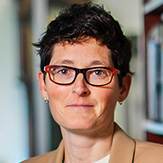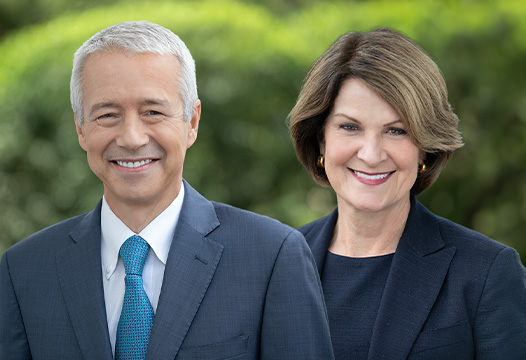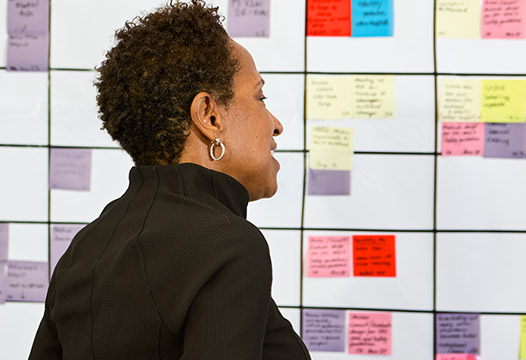We believe if we address the challenges facing health workers, we will improve healthcare for everyone. To accomplish this, we engage stakeholders and collaborators to support education and leadership programs, make investments in new models of care and advocate for systemic change.
With an anticipated shortfall of 10 million health workers by 2030,3 health inequities may deepen without deliberate, sustainable support for today’s health workforce and investment in the health workers of tomorrow. Robust community-based health systems with well-trained, well-equipped and well-supported nurses and community health workers (CHW) are foundational to achieving UHC to reach half the world that lacks essential health services.4 These health workers play a critical role in delivering inclusive, equitable and cost-effective primary healthcare by helping communities manage their health and creating a trusted bridge to formal health systems. Policies & Positions: Position on Universal Health Coverage
Supporting health workers has been a J&J Health for Humanity Goal for several years, and in 2022, we achieved our goal of supporting more than 1.3 million health workers. In 2023, we reached 972,800 nurses, midwives and CHWs, bringing our overall total to more than 2.28 million health workers supported since 2021. Our activities in 2023 bolstered frontline healthcare in the U.S. and around the world, including:
Supporting access to community healthcare
We have maintained our decades-long philanthropic partnerships with an active and deeply embedded network of community organizations, continuously working to understand local needs and support effective solutions for the New Brunswick, where our global headquarters are located, and greater New Jersey community. Among the initiatives we support are:
- continuation of the Community Interpreter Program in partnership with the local Community Health Center and Rutgers University, a program we jointly founded 25 years ago that continues to be relevant in today’s increasingly diverse community;
- expansion of community-based Health Navigator (Promotoras) and visiting nurse programming to conduct culturally relevant outreaches that deepen the understanding of patient needs, break down barriers, and enable connection and referral to appropriate care.
These programs typically serve the underinsured, uninsured and financially vulnerable community members in New Brunswick and the broader region. Local partner survey data show that as many as 70% of patients prefer or need their clinical encounters to be conducted in a language other than English.
Additionally, through the Johnson & Johnson Foundation, we continue to support the New Jersey health workforce pipeline through:
- substantial scholarships and academic support for students pursuing nursing and health-related fields of study at Middlesex College and the Independent Colleges of New Jersey;
- seed-funding the healthcare component of the New Jersey Pay It Forward program, led by the NJ CEO Council, which provides no-interest, no-fee loans to nursing students at Hudson County College in Jersey City, starting with the class graduating in June 2023.
Championing nurses across the U.S.
J&J has proudly championed the nursing profession for more than a century. With the invaluable insights that come from hands-on experience, nurses are uniquely positioned to move healthcare forward. When we work together to support nurses, we advance better healthcare for all. In 2023, we supported nurses by:
- Driving interest in nursing and making the profession more accessible by providing 113 scholarships and running advertising geared toward recruiting nursing students from underrepresented groups, as well as supporting minority participation at the Chief Nursing Officer Institute to build and strengthen emerging nurse executives’ leadership skills. To spark interest in the nursing profession, we partnered with the Association of periOperative Registered Nurses (AORN) to drive awareness of the perioperative specialty that is experiencing a shortage.
- Improving innovation skills through NurseHack4Health events with Microsoft and SONSIEL that provided nurses with the skills, resources and frameworks to implement innovation within their organizations, including helping enable a nurse-led team from Vancouver Coastal Health to bring its AI charting solution to life. Alongside this, the Johnson & Johnson Foundation partnered with the Institute for Healthcare Improvement to fund a New Models of Care project, working with five health systems to help scale innovative acute care delivery systems that attract a diverse nursing workforce.
- Catalyzing a healthy work environment through programs and partnerships like the J&J Nurse Innovation Fellowship, powered by Penn Nursing and The Wharton School at the University of Pennsylvania, we supported 20 senior nurse leaders to advance nurse-led innovation and leadership within health systems.

Nurses are natural innovators, but for them to create and implement rigorous innovative solutions to the problems they see in their practice requires education, training, resources and mentorship. That is why the programs supported by Johnson & Johnson are so critical to empowering nurses to lead in the healthcare innovation space. They provide experiences that most nurses will not get anywhere else.”
Addressing the impacts of climate change on health equity in the U.S.
We are focusing our environmental health equity efforts on communities that may experience health inequities exacerbated by climate change Through The Climate Health Equity for Community Clinics Program, an initiative J&J supports with Americares and The Center for Climate, Health and the Global Environment at Harvard T.H. Chan School of Public Health (Harvard Chan C-CHANGE), we aim to bolster climate resilience in 100 free and charitable clinics and community health centers across the U.S. by 2025. In 2023, the first 10 pilot clinics got underway and will develop evidence-based action plans to protect vulnerable patients from the health impacts of climate change. These clinics, located in Arizona, Florida and Louisiana, will first focus on the health impacts caused by extreme heat. Examples of interventions could include setting up call centers to share relevant health information during heatwaves and partnering with existing community organizations that conduct home wellness checks to monitor patient safety as temperatures rise or to transport vulnerable patients to cooling centers.
We also continue to support the Climate and Health Equity Fellowship, a program led by the Medical Society Consortium on Climate and Health, to empower physicians of color to become leaders in climate and health equity education, advocacy and patient care. Each Fellow completes a 10-month intensive training program, including a project related to climate change and health equity. 2023 marked the third year of the program, which has supported more than 30 Fellows from across the U.S.
Supporting Kenya’s community health workforce
In September 2023, members of the J&J team representing the Johnson & Johnson Foundation joined His Excellency Dr. William Ruto, President of Kenya, to reverse decades of health system reliance on women’s unpaid labor by launching a new initiative to pay, equip and digitize 100,000 CHWs and formally integrate them into the country’s health system. This milestone was achieved against the backdrop of the Community Health Units for Universal Health Coverage (CHU4UHC) platform, co-created with the Ministry of Health in 2019 with support from the J&J Foundation, which in turn led to a holistic Kenya Community Health Strategy. CHU4UHC played a catalytic role in mobilizing co-funders and government bodies to collaborate on a plan to address CHW issues at a systemic level and put Kenya on a path toward UHC by 2030.
Advancing the vision of Healthy China 2030
Facing a shortage of CHWs, part of China’s Healthy China 2030 plan, aims to provide training to 100,000 CHWs in several key areas including treatment and control of common diseases, health promotion for the elderly, and mental health rehabilitation services. The Johnson & Johnson Foundation provided a grant to China’s National Health Commission’s International Health Exchange and Cooperation Centre to enable capacity building initiatives that improve primary healthcare services and mental health support.
Empowering community health workers in Brazil
Through the J&J Foundation, we supported establishment of A CASA to support CHWs in Brazil. The A CASA project is a space for connection, learning, improvement, and exchange for CHWs to improve their overall work experience and working conditions. Designed and managed in collaboration with the Institute for Research and Support for Social Development, the National Council of Municipal Health Secretariats and the National Confederation of Health Agents, the project has already impacted more than 10,000 CHWs, and plans are in place to further expand the program across all 26 states in Brazil.
Easing pressure on UK’s mental health services
To help boost capacity among clinical staff in the UK to engage in preventive mental healthcare, Mental Health UK proposed the Mental Health Navigation model as a cost-effective, person-centered approach to mental healthcare. The three-year Community Mental Health Navigator pilot program was launched in 2020, with support from J&J UK and the Johnson & Johnson Foundation to address the non-clinical needs of people experiencing mental illness. With the aim of reducing demand on the capacity of general practitioners, mental health nurses and other care professionals, four navigators were initially funded, and this expanded to 16 during the pilot, reaching almost 5,000 patients. The program has been further expanded with funding from the UK National Health Service, and now approximately 40 navigators are operating in the UK with plans to embed a navigator in primary care networks across the country.
Impact investing to accelerate access to healthcare worldwide
Impact Ventures by the Johnson & Johnson Foundation is a $50 million impact investment fund focused on companies and entrepreneurs innovating to improve health equity and accelerate access to quality and affordable healthcare for under-resourced patients around the world. Financial returns from successful portfolio companies are reinvested, enabling further expansion of the fund’s impact. Impact Ventures also actively supports its portfolio companies, leveraging the broad network and healthcare expertise across J&J.
This was a year of significant investment activity, doubling the size of the Impact Ventures portfolio to more than 20 total investments. Investments included Viebeg Medical, a company creating more robust supply chains for medical equipment in Africa, and Certinell, a telehealth and remote monitoring company helping Federally Qualified Health Centers and communities of color in the U.S. Since joining the portfolio, investees have reached more than 3.4 million patients directly and supported more than 90,000 healthcare workers. Most of these investments are in LMICs or under-resourced communities in the U.S. Impact Ventures has also actively supported the broader ecosystem for health equity entrepreneurship, providing early-stage funding for accelerator programs and venture competitions, often to under-represented founders.
3 WHO, “Health Workforce,” https://www.who.int/health-topics/health-workforce, accessed February 2024.
4 WHO, “Billions left behind on the path to universal health coverage,” https://www.who.int/news/item/18-09-2023-billions-left-behind-on-the-path-to-universal-health-coverage, accessed February 2024.




